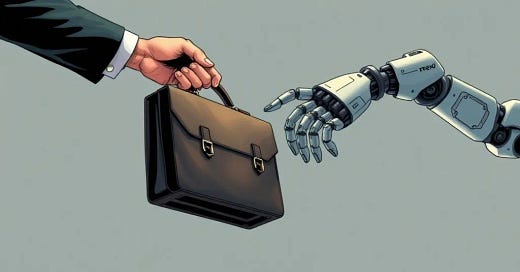If AI takes all the jobs… who’s left to buy anything?
Machines don’t shop. Humans do. What happens when they can’t?
This post is part of the series Thoughtful Insights.
If you’re specifically searching for Remote Jobs,
check out the curated list here → Remote Jobs List
It’s a question few dare to explore—because it challenges the very foundation of how our economies function.
We’re racing ahead with automation.
Celebrating 10x productivity gains.
Admiring tools that can design, write, build, and analyze in seconds.
Every new AI breakthrough is a marvel.
But while we chase progress, we ignore a basic truth:
In a world where machines do all the work, what happens to the people who no longer earn a living?
Think about it.
Our current economic engine runs on a simple loop:
People work → earn money → spend that money → businesses grow → more jobs are created.
That loop keeps society afloat.
Now imagine this:
A logistics company replaces 80% of its drivers with autonomous vehicles.
A marketing agency uses AI to replace half of its creatives.
A software company cuts 60% of its developers thanks to code-generating tools.
Profits go up.
Efficiency soars.
But what about demand?
Who’s going to buy products when most people are struggling to pay rent, let alone upgrade their phone?
We’ve heard reassuring narratives:
“AI will only replace tasks, not entire jobs.”
“New industries will emerge, just like with the internet or the industrial revolution.”
“People will reskill, adapt, and thrive.”
Maybe that’s true for some.
But history shows us that transitions of this scale are painful, uneven, and slow.
The printing press took centuries to spread literacy.
The Industrial Revolution took generations to stabilize labor markets.
AI is moving at warp speed.
It doesn’t take decades—it takes months.
So here’s the paradox:
The more we optimize for efficiency,
The less we account for human livelihood.
A business might celebrate cutting 1,000 jobs.
But each of those jobs was someone’s rent.
Someone’s child’s school fees.
Someone’s dignity.
You can’t separate the economy from the people who participate in it.
Here’s what’s quietly at stake:
A shrinking middle class with less spending power.
A rise in gig work that offers flexibility—but no stability.
Young professionals competing with machines, not other humans.
And a global market full of products—yet empty of buyers.
We risk building a world where the shelves are full…
And the wallets are empty.
But it doesn’t have to be this way.
We have choices to make:
✅ Do we build safety nets—like universal basic income—to protect those displaced?
✅ Do we redefine work beyond just jobs and titles, valuing care, community, and creativity?
✅ Do we ensure access to AI, so it empowers individuals instead of replacing them?
The future isn’t just about smarter machines.
It’s about wiser systems.
Systems that don’t just chase profits—but sustain people.
Because if we’re not designing a future where humans still belong…
Then we’re not innovating.
We’re erasing.
AI should make life better for everyone—
Not just more profitable for a few.
The question isn't whether AI can replace us.
It's whether you will help shape a future where people still have purpose, dignity, and a place.
Because progress means nothing—
If it doesn’t include YOU, too.
This post is part of the Remote Jobs and You newsletter on Substack. Each edition brings you the latest remote job opportunities and an insightful read tailored for modern professionals.





Great insights! These topics are dear to my heart, as evident by my own substack. I don't write on remote work but on career prep for recent grads who don't know what they're walking into. Would you be interested in collaborating on a piece?
Right ✅